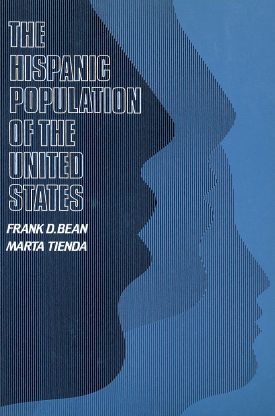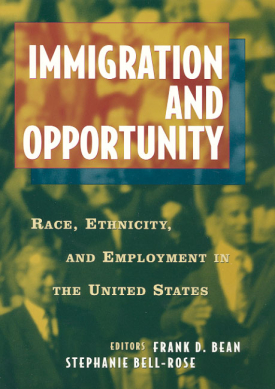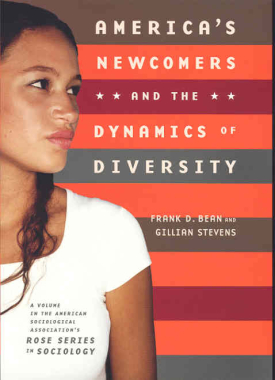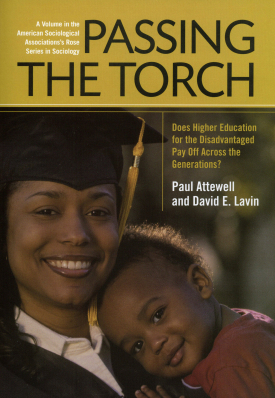American Women in Transition
About This Book
This is the first in a series of eighteen projected volumes, to be published over the next two years, aimed at converting the vast statistical yield of the 1980 Census into authoritative analyses of major changes and trends in American life. A collaborative research effort, funded by public and private foundations, this series revives a tradition of independent Census analysis (the last such project was undertaken in 1960) and offers an unparalleled array of studies on various ethnic, geographic, and status dimensions of the U.S. population.
It is entirely appropriate that the inaugural volume in this series should document trends in the status of American women. Dramatic social and demographic changes over the past two decades make American Women in Transition a landmark, an invaluable one-volume summary and assessment of women's move from the private domain to the public. Clearly and in detail, the authors describe women's increasing educational attainment and labor force participation, their lagging earning power, their continued commitment to marriage and family, and the "balancing act" necessitated by this overlap of roles. Supplementing 1980 Census data with even more recent surveys from the Census Bureau and other federal agencies, Bianchi and Spain are able to extend these trends into the 1980s and sketch the complex challenges posed by such lasting and historic changes.
This definitive and sensitive study is certain to become a standard reference work on American women today, and an essential foundation for future scholarship and policy concerning the status of women in our society.
SUZANNE M. BIANCHI is a demographer at the Center for Demographic Studies at the U.S. Bureau of the Census.
DAPHNE SPAIN is assistant professor of sociology and urban planning at the University of Virginia.
A Volume in the RSF Census Series
RSF Journal
View Book Series
Sign Up For Our Mailing List
Apply For Funding

The Hispanic Population of the United States
About This Book
The Hispanic population in the United States is a richly diverse and changing segment of our national community. Frank Bean and Marta Tienda emphasize a shifting cluster of populations—Mexican, Puerto Rican, Cuban, Central and South American, Spanish, and Caribbean—as they examine fertility and immigration, family and marriage patterns, education, earnings, and employment. They discuss, for instance, the effectiveness of bilingual education, recommending instead culturally supportive programs that will benefit both Hispanic and non-Hispanic students. A study of the geographic distribution of Hispanics shows that their tendency to live in metropolitan areas may, in fact, result in an isolation which denies them equal access to schooling, jobs, and health care.
Bean and Tienda offer a critical, much-needed assessment of how Hispanics are faring and what the issues for the future will be. Their findings reveal and reflect differences in the Hispanic population that will influence policy decisions and affect the Hispanic community on regional and national levels.
"...represents the state of the art for quantitative analysis of ethnic groups in the United States." —American Journal of Sociology
FRANK D. BEAN is Ashbel Smith Professor of Sociology at the University of Texas, Austin, and codirector of the Program for Research on Immigration Policy at the Urban Institute.
MARTA TIENDA is professor of sociology and subdirector of the Population Research Center at the University of Chicago.
A Volume in the RSF Census Series
Download
RSF Journal
View Book Series
Sign Up For Our Mailing List
Apply For Funding

Immigration and Opportunity
About This Book
The American dream of equal opportunity and social mobility still holds a powerful appeal for the many immigrants who arrive in this country each year. but if immigrant success stories symbolize the fulfillment of the American dream, the persistent inequality suffered by native-born African Americans demonstrates the dream's limits. Although the experience of blacks and immigrants in the United States are not directly comparable, their fates are connected in ways that are seldom recognized. Immigration and Opportunity brings together leading sociologists and demographers to present a systematic account of the many ways in which immigration affects the labor market experiences of native-born African Americans.
With the arrival of large numbers of nonwhite immigrants in recent decades, blacks now represent less than 50 percent of the U.S. minority population. Immigration and Opportunity reveals how immigration has transformed relations between minority populations in the United States, creating new forms of labor market competition between native and immigrant minorities. Recent immigrants have concentrated in a handful of port-of-entry cities, breaking up established patterns of residential segregation,and, in some cases, contributing to the migration of native blacks out of these cities. Immigrants have secured many of the occupational niches once dominated by blacks and now pass these jobs on through ethnic hiring networks that exclude natives. At the same time, many native-born blacks find jobs in the public sector, which is closed to those immigrants who lack U.S. citizenship.
While recent immigrants have unquestionably brought economic and cultural benefits to U.S. society, this volume makes it clear that the costs of increased immigration falls particularly heavily upon those native-born groups who are already disadvantaged. Even as large-scale immigration transforms the racial and ethnic make-up of U.S. society—forcing us to think about race and ethnicity in new ways—it demands that we pay renewed attention to the entrenched problems of racial disadvantage that still beset native-born African Americans.
FRANK D. BEAN is professor of sociology and director of the Immigration Policy Research Project at the University of California, Irvine.
STEPHANIE BELL-ROSE was formerly legal counsel and program officer at the Andrew W. Mellon Foundation.
CONTRIBUTORS: Richard D. Alba, Barry Edmonston, Walter C. Farrell Jr., Mark A. Fossett, William H. Frey, Jennifer E. Glick, Jomas H. Johnson, Karen D. Johnson-Webb, John R. Logan, Jeffrey S. Passel, Alejandro Portes, Michael J. Rosenfeld, Marta Tienda, Jennifer Van Hook, Roger Waldinger, Mary C. Water, Michael J. White, Franklin D. Wilson, Min Zhou.
RSF Journal
View Book Series
Sign Up For Our Mailing List
Apply For Funding

America's Newcomers and the Dynamics of Diversity
About This Book
A Volume in the American Sociological Association’s Rose Series in Sociology
Winner of the 2003 Otis Dudley Duncan Award for Outstanding Scholarship in Social Demography
The attacks of September 11, 2001, facilitated by easy entry and lax immigration controls, cast into bold relief the importance and contradictions of U.S. immigration policy. Will we have to restrict immigration for fear of future terrorist attacks? On a broader scale, can the country's sense of national identity be maintained in the face of the cultural diversity that today's immigrants bring? How will the resulting demographic, social, and economic changes affect U.S. residents? As the debate about immigration policy heats up, it has become more critical than ever to examine immigration's role in our society. With a comprehensive social scientific assessment of immigration over the past thirty years, America's Newcomers and the Dynamics of Diversity provides the clearest picture to date of how immigration has actually affected the United States, while refuting common misconceptions and predicting how it might affect us in the future.
Frank Bean and Gillian Stevens show how, on the whole, immigration has been beneficial for the United States. Although about one million immigrants arrive each year, the job market has expanded sufficiently to absorb them without driving down wages significantly or preventing the native-born population from finding jobs. Immigration has not led to welfare dependency among immigrants, nor does evidence indicate that welfare is a magnet for immigrants. With the exception of unauthorized Mexican and Central American immigrants, studies show that most other immigrant groups have attained sufficient earnings and job mobility to move into the economic mainstream. Many Asian and Latino immigrants have established ethnic networks while maintaining their native cultural practices in the pursuit of that goal. While this phenomenon has led many people to believe that today's immigrants are slow to enter mainstream society, Bean and Stevens show that intermarriage and English language proficiency among these groups are just as high—if not higher—as among prior waves of European immigrants. America's Newcomers and the Dynamics of Diversity concludes by showing that the increased racial and ethnic diversity caused by immigration may be helping to blur the racial divide in the United States, transforming the country from a biracial to multi-ethnic and multi-racial society. Replacing myth with fact, America's Newcomers and the Dynamics of Diversity contains a wealth of information and belongs on the bookshelves of policymakers, pundits, scholars, students, and anyone who is concerned about the changing face of the United States.
FRANK D. BEAN is professor of sociology and director, Center for Research on Immigration, Population, and Public Policy, University of California, Irvine.
GILLIAN STEVENS is associate professor of sociology at University of Illinois, Urbana-Champaign.
RSF Journal
View Book Series
Sign Up For Our Mailing List
Apply For Funding
Asians and Pacific Islanders in the United States
About This Book
Asians and Pacific Islanders in the United States examines in comprehensive detail the most rapidly growing and quickly changing minority group in the United States. Once a small population, this group is now recognized by official census counts and by society as a diverse people, comprised of Japanese, Chinese, Koreans, Filipinos, Hawaiians, Samoans, and many other heritages. However, the conception that Asians are a single and successful model minority still exists, though they are in fact a complex and multidimensional people still struggling in the pursuit of the American dream.
"...a major addition to the literature on recent immigration. The book is lucidly written by three demographers eager to convey their findings and analyses to general readers as well as to fellow professionals. It provides easily accessible information and useful commentary, making it an excellent resource for anyone interested in those groups now lumped together under a single Census Bureau rubric." —Choice
"This is a demographer's delight....The major question addressed in this book is: How well are the new Asian immigrants adapting to American society? Barringer, Gardner, and Levin cogently argue and convincingly demonstrate that the response to the question is much more complex than suggested by articles in the popular press....an important book and highly recommended." —Contemporary Sociology
"For the real scoop on the state of Asian America, turn to the Russell Sage Foundation's excellent Asians and Pacific Islanders of the United States. The best demographic overview, it makes a strong case for Asian-American success without overlooking genuine problems." —Reason
"...a comprehensive study of the size, diversity, and complexity of the Asian and Pacific Islander populations based on the 1980 census and subsequent mid-census assessments prior to the 1990 census....sheds a particularly interesting light on the shifting nature of recent Asian and Pacific Islander immigration and the related but often undocumented secondary movement of populations after arrival."—The Annals of the American Academy of Political and Social Science
HERBERT BARRINGER is professor of sociology at the University of Hawaii–Manoa.
ROBERT W. GARDNER was assistant director of the East-West Population Institute, Hawaii. He now teaches demography at the Harvard School of Public Health.
MICHAEL J. LEVIN is a member of the Population Division of the U.S. Bureau of the Census.
A Volume in the RSF Census Series
Download
RSF Journal
View Book Series
Sign Up For Our Mailing List
Apply For Funding

Passing the Torch
About This Book
A Volume in the American Sociological Association’s Rose Series in Sociology
Winner of the 2009 Grawemeyer Award for the Best Book in Education
Winner of the 2009 Outstanding Book Award of the American Educational Research Association
The steady expansion of college enrollment rates over the last generation has been heralded as a major step toward reducing chronic economic disparities. But many of the policies that broadened access to higher education—including affirmative action, open admissions, and need-based financial aid—have come under attack in recent years by critics alleging that schools are admitting unqualified students who are unlikely to benefit from a college education. In Passing the Torch, Paul Attewell, David Lavin, Thurston Domina, and Tania Levey follow students admitted under the City University of New York’s “open admissions” policy, tracking its effects on them and their children, to find out whether widening college access can accelerate social mobility across generations.
Unlike previous research into the benefits of higher education, Passing the Torch follows the educational achievements of three generations over thirty years. The book focuses on a cohort of women who entered CUNY between 1970 and 1972, when the university began accepting all graduates of New York City high schools and increasing its representation of poor and minority students. The authors survey these women in order to identify how the opportunity to pursue higher education affected not only their long-term educational attainments and family well-being, but also how it affected their children’s educational achievements. Comparing the record of the CUNY alumnae to peers nationwide, the authors find that when women from underprivileged backgrounds go to college, their children are more likely to succeed in school and earn college degrees themselves. Mothers with a college degree are more likely to expect their children to go to college, to have extensive discussions with their children, and to be involved in their children’s schools. All of these parenting behaviors appear to foster higher test scores and college enrollment rates among their children. In addition, college-educated women are more likely to raise their children in stable two-parent households and to earn higher incomes; both factors have been demonstrated to increase children’s educational success.
The evidence marshaled in this important book reaffirms the American ideal of upward mobility through education. As the first study to indicate that increasing access to college among today’s disadvantaged students can reduce educational gaps in the next generation, Passing the Torch makes a powerful argument in favor of college for all.
PAUL ATTEWELL and DAVID LAVIN are professors of sociology in the Graduate Center at the City University of New York.
RSF Journal
View Book Series
Sign Up For Our Mailing List
Apply For Funding
Pagination
- Previous page
- Page 78
- Next page
